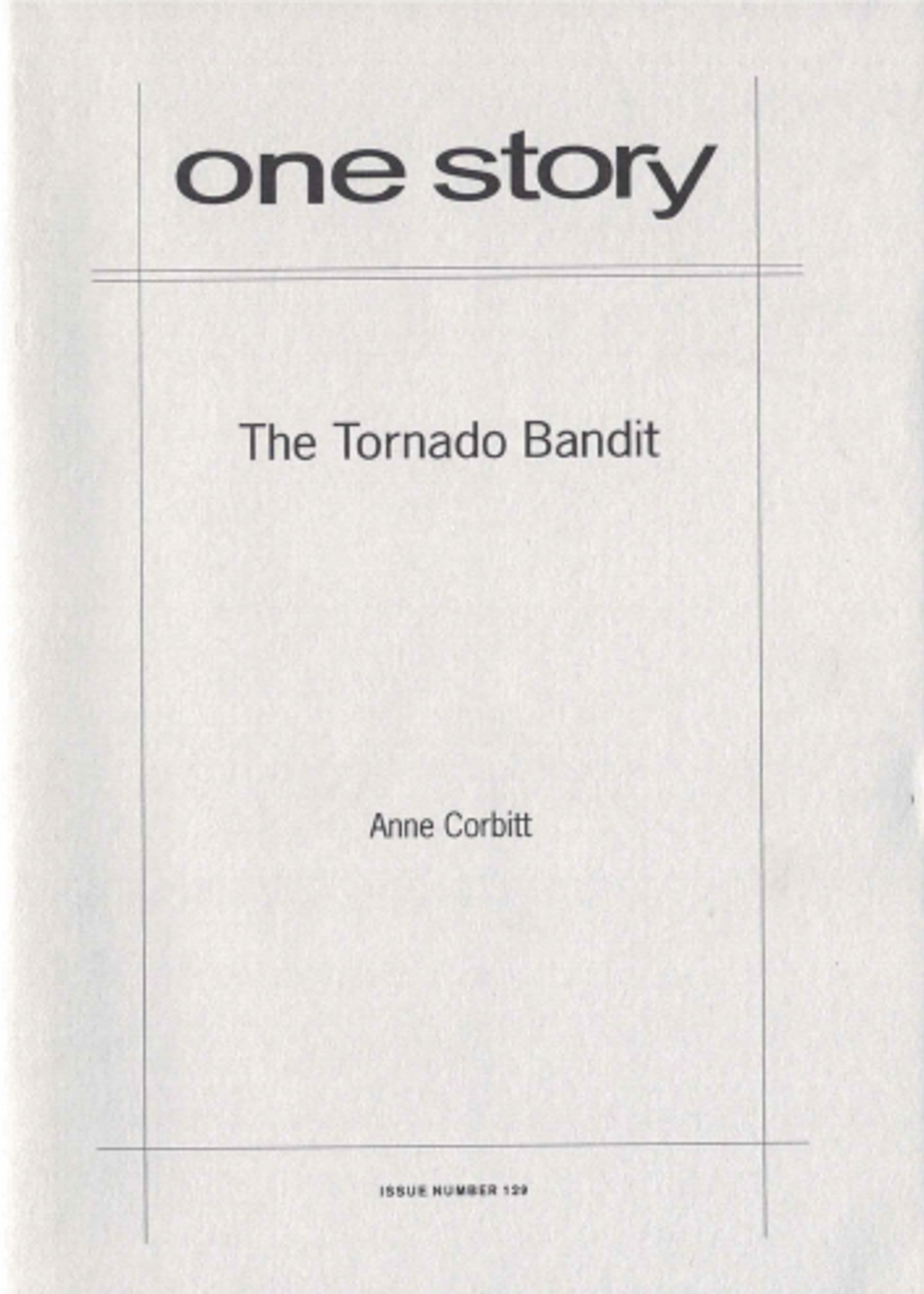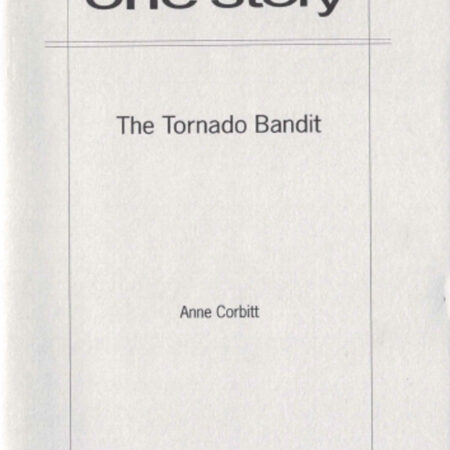
The Tornado Bandit
$2.50
67 in stock
Excerpt
Mitty and Carl Milton returned from their fortieth anniversary trip to Lookout Mountain to find their front and back doors kicked in, their dining room table split in half, couches upturned, flowerpots shattered on the sunroom floor, and a bloated, pruned man dead in their guest room shower stall. The man’s body slumped beside the shampoo rack, feet drooped over the doorway, the shower running, and a cord from the guest room blinds wrapped around his neck.
The police roped off the Milton’s yard, made plaster casts of footprints in the herb garden, and numbered the spent gun cartridges littering the front hallway, but Officer Patridge, a broad man with a toothpick in his mouth, didn’t seem all that optimistic.
“These things happen more than you know,” he told them. “We hardly ever get a single lead.”
Carl folded his arms and stood beside the officer, his default stance for selling top-of-the-line Pontiacs, as if to say: Even I have to step back and look. “You’re telling me other people had the same thing happen to them?” he asked.
Officer Patridge plucked strands of grass from Carl’s lawn. “Not exactly the same thing,” he said. “No one else had a corpse.”
Anne Corbitt
Anne Corbitt received her MFA in Fiction from the University of Mississippi on the John and Renée Grisham Fellowship. Her work has appeared or is forthcoming in journals such as The Greensboro Review, Fifth Wednesday, Pisgah Review, and Fourth River, where she won The Fourth River Award for Creative Nonfiction. She lives in Atlanta, where she is at work on a novel.
Q&A by Marie-Helene Bertino
- MB: Where did the idea for this story come from?
- AC: I love action movies, particularly spy or secret agent movies like James Bond and the Bourne series. Often these stories involve a chase scene, often past innocent bystanders, usually through homes or open-air markets. I remember one of these movies included a chase scene where 007 strangles the poor guy hired to pursue him and leaves the body in a random person’s bathroom. I kept thinking about the person who would come home to this corpse and have no idea where it came from or who it was and no real path to find out. I wrote the story the next day.
- MB: How long did it take you to complete this story?
- AC: The first draft came quickly: maybe an hour or two. Plenty of writers work that way regularly, but for me this was an anomaly. My first drafts are usually quite slow. I remember being kind of stunned by how quickly it came when I finished it, and I’m still surprised to see how much of that original draft is in this most recent version. The revision process has lasted for about a year and a half, with great help and patience from Marie-Helene Bertino and Hannah Tinti.
- MB: The Tornado Bandit is a jarring force that interrupts the lives of these people and leaves them changed forever. In your mind, who is The Tornado Bandit?
- AC: I’m almost embarrassed to answer your question truthfully because this is certainly not the most literary response, but I picture Matt Damon. By the time the Miltons discover the scene, he’s already in the French Riviera trying to snorkel aboard a heavily-armed yacht to foil a plot at worldwide destruction masterminded by a jewel thief with a disfiguring facial scar and access to weapons of biological warfare.
- MB: Leah Finkelstein is such a surprising, interesting character. In her arc lies the representation of what can go wrong after a traumatic experience, sort of “empowering gone bad.” How did you come up with her?
- AC: Building off the action movie genre, I worried about slipping into a glossy, fast-paced, on-the-run-but-still-in-heels kind of world. When I started to write this story, I tried to imagine what this experience would do to me, a person who is not spontaneous or a risk-taker. I decided the impact would be a lot more dangerous than I first imagined. If this happened to me, I hope that my reaction wouldn’t play out like Leah’s, but she is probably the character I relate to the most. Her story was always in the back of my mind, and I think in a similar way, it’s always in the background of Carl and Mitty’s story, almost like a bass line.
- MB: Ultimately, would you consider the Tornado Bandit to be a good or bad force in the lives of The Miltons?
- AC: Both. Or neither. I’m interested in events that interrupt our lives and demand we evaluate them. What we discover may not be a dream come true, but after finding a stranger’s corpse in your bathroom, there’s no going back.
- MB: “The Tornado Bandit” has a cast of supporting characters that are as interesting as the main characters. Officer Patridge, the rookie, Agent Crum, Barbara... Were you aware of the lively population of “extras” in the story? Was it your intent to give them personalities and pasts, too?
- AC: One of the biggest challenges of this story was keeping up with this cast, but I also drew a good bit of energy from the lives that overlapped with the main characters. In the early drafts, there were at least five or six additional secondary characters, but when you have such a wide population, some just don’t make the final cut. A lot of revision was spent figuring out who should. Before revising, I saw Mitty and Carl much more as the “straight men” around whom all this craziness played out, which I think led me to see the secondary characters’ stakes in the story as more urgent. The camera could shift, and versions of this story could play out for each of these supporting characters, which I hope adds development to the story I soon discovered I was telling, Carl and Mitty’s story.
- MB: The story ends on a dissonant note: The Miltons lay in a quiet night, seeming to be yearning for some kind of sound. It certainly isn’t a pat, finite ending. What influenced your decision to leave The Miltons there? Did you consider any other endings?
- AC: To be honest, I never really thought about another ending. The first draft ended here because this was where I ran out of things to say. That’s actually part of what makes the story sad for me: there is nothing else to say. Nothing else is going to happen to them, and the quiet of ending the story there is not unlike the quiet of their futures, which maybe wasn’t sad before but sure is now.
- MB: What is the best bit of advice about writing you have ever received?
- AC: My first story up for workshop with Barry Hannah was torn apart, mostly by Barry himself. I was devastated, so I went to talk to him afterwards. He said, “Anne, your story had plenty of beautiful sentences in it, but nothing is going on. There is no life or death. The world doesn’t need any more pretty sentences. The world needs a good story.” It’s simple advice, but I think a lot of us get caught up in and enamored of our own language, often neglecting plot. I certainly do. I have to remind myself that staring exclusively at trees won’t just lead to missing the forest but also to missing the start of a wildfire only a few yards away.
- MB: What are you working on now?
- AC: I’m polishing up a novel about a police investigation into events at a suburban high school. I’ve been working on it for over two years now. Like “The Tornado Bandit,” the novel follows a wide cast of characters each impacted differently by an event out of their control.
